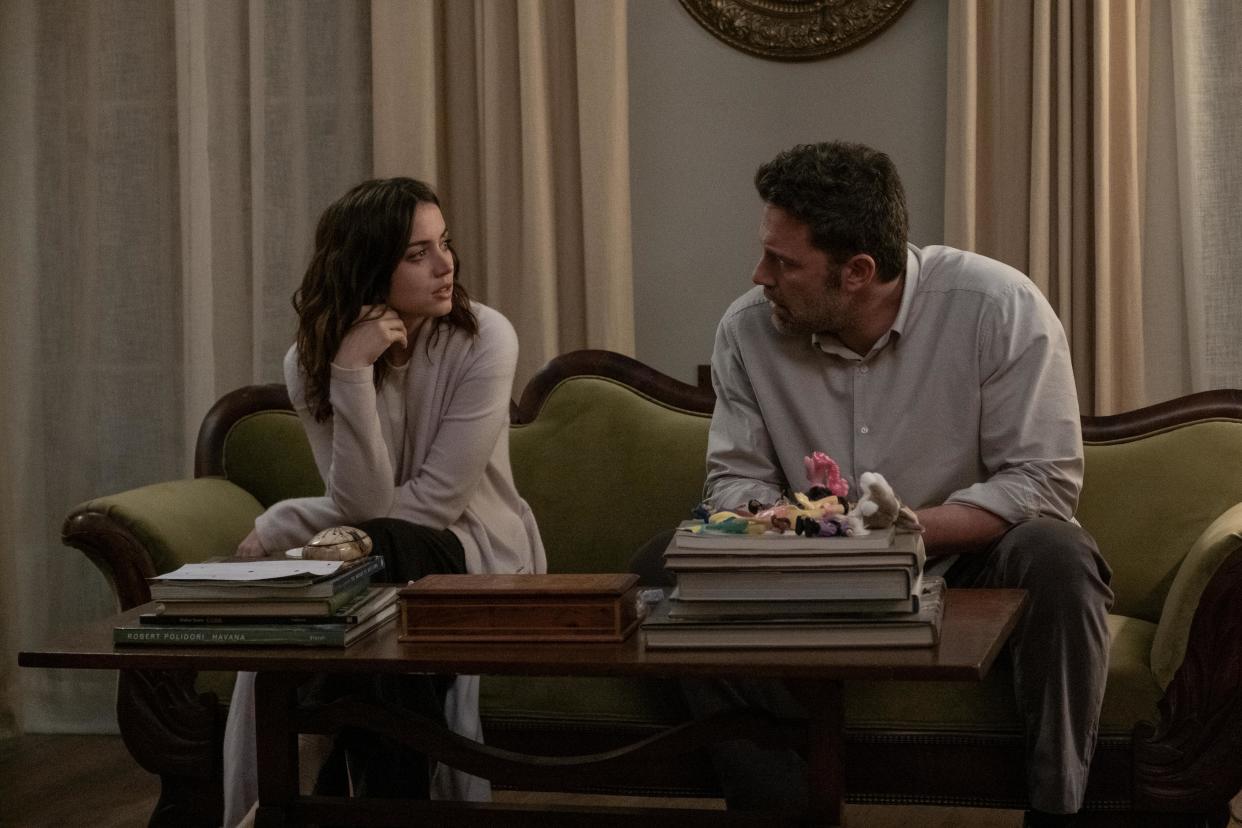'Deep Water' exposes misplaced nostalgia for an age of adult thrillers

- Oops!Something went wrong.Please try again later.
- Oops!Something went wrong.Please try again later.
Stumble upon Adrian Lyne’s “Deep Water” while scrolling through Hulu, and the film appears to be a throwback to an age of star-studded soap operas punctuated with some gratuitous violence and graphic depictions of affection.
Yet it’s a very new film with some modern modifications. The film’s tortured path to public consumption once again opens the debate as to whether Hollywood will make movies for adults again. Where the days of frank depictions of amorous desires are only a memory shrouded by IP products featuring gorgeous movie stars in spandex and capes.
Although it is important to remember that just because we don’t make certain movies anymore doesn’t mean they were any good in the first place.
Let’s back up for a moment. “Deep Water” is the story of Vic and Melinda (Ben Affleck and Ana de Armas), a couple with too much money and too much time on their hands in their antebellum.
Melinda drinks to excess and cavorts with other men. Vic stands to the side, watching with an insincere smile and dead eyes that Affleck can do better than anyone else. (See “Gone Girl.”) Whether he’s upset or finds strange satisfaction in this passive role is never quite revealed.
But Vic is not without reaction. While Melinda thinks their marriage is perfectly open, Vic assures one potential suitor that the last guy who stepped out with his wife ended up dead. Vic laughs, but then it is quickly revealed the homicidal allusions are quite real.
More: Why "The Batman" keeps us coming back to different takes on the same story
Many critics have complained that big reveals so early into “Deep Water” drain the film of tension. I disagree — rather, the conflict in the film comes from why these two choose to stay with one another despite all of this.
He’s a killer and she’s a cheater. Which is outrageously over-the-top, but presents a provocative question as to what it would take to walk away from love. The struggle in walking away from a soulmate who also turns out to be a monster.
This film’s premise only works due to the chemistry between the two leads. For all the coincidences and convolution of its climax, there’s no doubt Affleck and de Armas really sizzle together.
More enraptured critics used the film's release to lament the death of a type of movie that deals with adults and sex in a non-jokey way. They noted Lyne — who directed classics of the sub-genre like “Fatal Attraction” and “9 1/2 Weeks” — returned to moviemaking with this project after a two-decade absence. Not to mention “Deep Water” went directly to streaming after its studio pulled a mid-January release date.
Not a new question, but the fate of “Deep Water” caused a wave of nostalgia for middle-aged male critics who remember a golden era when adult thrillers could clean up at the box office. Halcyon days when “Basic Instinct,” celebrating its 30th anniversary this month, was a cultural touchstone.
This glowing hindsight ignores how these types of films were full of horrendous dialogue and offensive stereotypes. Recent viewings of “Fatal Attraction” and “Basic Instinct” reveal stylistically-shot movies with women who simply use their bodies as means to torment unassuming, harmless male protagonists.
No one in these films was innocent, mind you, but the clear takeaway is that the men were defenseless in these situations. Sex wasn’t bad, unless the woman used it as a way to control those around her. But there was always a comeuppance for any femme fatale who thought she could take charge of the relationship. Or any man. Or any situation often dominated by men.
More: Ragtag Cinema secures singular screening of buzzworthy indie 'Memoria'
The presence of these themes makes sense when you look at the time that made these films sensations. The country reeled from the sexual revolution of the 1960s, recoiling at seeing traditional social concepts like marriage crumble while AIDS claimed the lives of people who were finally being true to themselves.
Sex was not only scary, but it was also deadly. While this was a driving sentiment for all types of people, the directors were almost always men and the male character was always the one at risk.
The ideas are interesting, but usually they were placed in hyperbolic potboilers that don’t live up to their potential. When I read a film critic speak fondly of “The Hand That Rocks the Cradle,” I imagine them stumbling upon the Rebecca De Mornay thriller on The Movie Channel and watching this seductive yet motherly surrogate enticing and entrapping her male victims.
Funny feelings emerge. Perfectly natural, but this doesn't make the movie a classic.
“Deep Water” is just as good as any of the films from that earlier era. Maybe better given the sexual politics have changed and characters are on equally rotten footing. It’s a good film, and an interesting film.
But don’t fall for its wily charms or igaslighting of a time that never existed. In fact, it exists as many of these types of films do: waiting on cable for you to find at the oddest of hours.
In real life, James Owen is a lawyer and executive director of energy policy group Renew Missouri. He created/wrote for Filmsnobs.com from 2001-2007 before an extended stint as an on-air film critic for KY3, the NBC affiliate in Springfield. He was named a Top 20 Artist under the Age of 30 by The Kansas City Star when he was much younger than he is now.
This article originally appeared on Columbia Daily Tribune: 'Deep Water' exposes misplaced nostalgia for an age of adult thrillers

